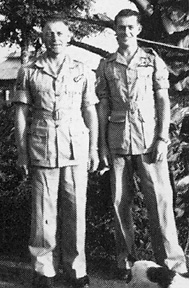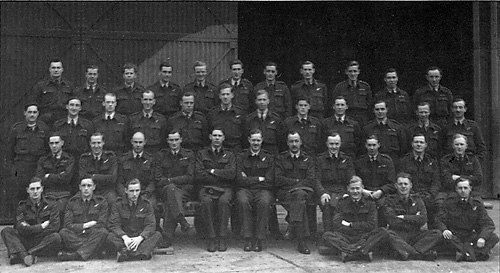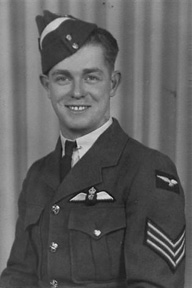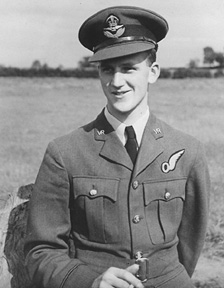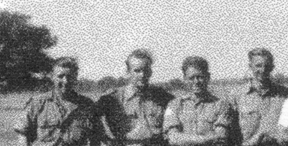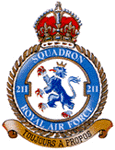 |
 |
||||||
|
Warrant Officer BB Mearns 1550874 RAFVR/Pilot Officer 184096 Bernard Brodie “Barney” Mearns was a Scot from Aberdeen. While a Prisoner of War, he gave his address as 132 Tunmarsh Lane, Plaistow in London’s East End. On return to the UK in 1945, he was soon at home once more in Farmers Hall, Aberdeen. Barney Mearns’ part in the air war in Burma is shown in the records of 211 Squadron, in the accounts of others, and by a single compelling letter of his own that was the original driving force for this page. Among those other personal accounts is that of a particular friend: W/O FH “Fred” Burton. The two had trained as Navigators together on Beaufighters and then on to postings with 177 Squadron in India, as it worked up to operational readiness in early 1943. In later life, Fred Burton wrote a sparkling account of operations with 177 Squadron, in his self-published Mission to Burma. Fred passed away in 1992 but his splendid little book remains, not too easily found but well regarded by Beaufighter men of the Burma campaign. With Betty Burton’s kind permission, it has been possible to add much to the story of Barney Mearns’ war service thanks to her late husband’s book.
Barney Mearns first appeared in the 211 Squadron account when posted in on 6 November 1943 as a Navigator from 177 Squadron with his pilot, the Canadian P/O GA “Alf” Waddell J12691. Over coming months, the two Beaufighter Squadrons were to co-operate closely on the ground and in the air. Beginnings
Sgt Alf Waddell second from the left, standing, rear. Sgt BB Mearns front row, second from the right.Next to him, last on the right, is Sgt Fred Burton. When he and Barney joined 211 Squadron, Alf Waddell had already been commissioned Pilot Officer. On arrival, he was promptly detached to RAF Bamrauli but by 16 January 1944 the pair were back together on the operations roster. That afternoon there was plenty of cloud at 5,000ft as they patrolled the railway from Namkin and on to Kadu and Mohnyin in LZ130 S-Sugar. They found their rockets ineffective against the Namkin railway bridge but had more luck raking the tracks with them and later, with cannon-fire, striking a locomotive and rolling stock. Mearns was made Flight Sergeant in February. By March, he was suffering some ligament damage in one leg, which took him to hospital for a time. While he was off flying duty, Alf Waddell continued, first with F/Sgt Butcher and later with F/O Jack Woodall in the back seat. Sadly, while Barney Mearns was out of action, Alf Waddell and F/O Woodall were posted missing.
A very pleased and newly qualified Sgt Pilot, sometime in 1942, the white flash of the trainee in Alf’s cap soon to be taken down and perhaps tucked away in his “bits and bobs” as a memento.
Jack, also in jaunty mood, the thin ring of the Pilot Officer readily seen on his sleeve, VR pins of an RAFVR officer in his lapels. Commissioned in December 1942 directly from LAC presumably on qualifying as an Observer, by August 1943 he had been gazetted as Flying Officer. Jack Woodall and Alf Waddell were posted missing on 27 March 1944 after their Beaufighter LZ113 ‘V’ encountered intense AA fire over Taungup. In LZ515 ‘X’, F/Sgts Gamlin and Lightfoot returned safely, reporting ‘V’ last seen heading North, 5 miles North of the target. The two crew were never found and are today commemorated on the Singapore Memorial, thanks to the Commonwealth War Graves Commission. Having advanced to Warrant Officer in the meantime, in May 1944 Barney Mearns returned to flying duties as navigator to Frederick Thomas “Fred” Gamlin, at that time still a Flight Sergeant. By August, both men had been commissioned, though Barney was still listed as WO in the Squadron record, his gazettal yet to come. The two failed to return from an attack on Pyinmana railway junction on 12 August 1944: reporting engine trouble with NE713 Z-Zebra, they force-landed into captivity. Their capture and later release is noted briefly in the India and Burma narrative of the late Peter Spooner, and in the narrative of George Manderson DFC the pair are shown in an earlier, 1943 group photo, enlarged below:
Back Row L to R: 3 Mearns and 4 Gamlin (PoW's released from Rangoon Gaol June 1945).” [A small slip, easily made if the boys caught up in June. Effectively freed by their own initiative, the PoWs from Rangoon Gaol were evacuated by the newly arrived Dracula forces on 4 May.] It was fortunate indeed that both men survived in the appalling conditions of Rangoon Gaol. Among their companions in adversity had been F/Lt John “Jack” Luing, missing from operations on 8 March 1944 with 136061 F/O GJ White. Sadly, neither Jack Luing nor Gordon White survived captivity. The hint in Barney’s 1945 letter that he had been commissioned produced, after further careful search of the London Gazette, his commission as a Pilot Officer on probation with effect from 21 July 1944: Royal Air Force Volunteer Reserve A later Gazette showed that he was subsequently promoted to Flying Officer. At Poona, shortly after the liberation of Rangoon, Fred Burton was very pleased to spot Barney Mearns, recently freed, still recovering from the effects of his captivity. The pair had a long yarn about what it was like to survive as a prisoner of war under the Japanese. They kept in touch for a time after returning home. Fred Burton later recalled that Mearns married the nurse that he had met while recuperating in hospital in India—they were to make their post-war life in East Africa. Repatriated to the UK in 1945, a letter from Jack Luing’s mother finally caught up with Barney Mearns while on leave at home in Aberdeen that August. He then set down his thoughts about Jack and the circumstances of their captivity in a reply of great kindness and utter frankness. The Luing family have kept that reply safe these many years past, as explained on Jack’s page. With the kind permission of Peter and Tessa Luing, then, here is the Rangoon Gaol PoW narrative of 1550874 F/O Bernard Brodie Mearns, Navigator, of 211 Squadron RAF. I have silently made some very sparing spelling alterations, and added details of the capture and death of Jack Luing’s friend and cell-mate Jack Bovier. This remarkable letter has a simple grandeur which requires no further amplification or embellishment. 3 Farmers Hall My dear Mrs Luing, I am terribly sorry that you have to wait so long for a reply to your letter, but I only received it today when I came home again on leave, as it had been sent to India and then back to the Air Ministry. First of all, let me say how very sorry I am if I have been instrumental in any way, in causing you so much sorrow, and that I would have given anything to say that your son Jack was still alive, when we were interviewed in Bombay. Unfortunately, such was not the case, and if I can in any way ease the minds of yourself, your family, and Jack's wife by telling you what I know, I shall be only too pleased to do so. I am afraid it is far from being a pleasant story, but you ask for the truth and I think it best you should know. Indeed, on Monday at Cosford, I met my pilot Fred Gamlin, and he told me that he had received a letter from your daughter-in-law, and said, in all probability I would receive one too. We decided then that nothing would be gained from hiding the truth from you, as the stories you will have read in the papers would cause you to distrust anything we said, were we to try and paint a rosy picture. When Jack joined 211 Sqdn I was an NCO and as a result did not know your son as well as I would have liked, we being in different messes, but from what I saw of him down at the flights and on other occasions when I used to go over to my first pilot's quarters and met Jack, I liked him very much and we got on quite well together. This was probably due more to the fact that my then pilot F/O Alf Waddell was one of Jack's best friends. At the end of February I twisted my knee playing football and had to go to hospital. I did not get back until the end of March when I found we had lost about seven crews, including Jack and F/O White and my own pilot - F/O Woodall [sic—Waddell and Woodall were lost together as pilot and navigator]. You can appreciate that the squadron was not a very cheery one at that time with having lost so many of our pals, and what made it worse was that there was practically nothing known of any of them. I crewed up with Fred Gamlin, and we were lucky until 12th August when we also were unable to return to base due to engine trouble and had to crash land south of Meiktila. We were in Japanese hands that night and after being taken to Meiktila for interrogation, were taken down to Rangoon on 17th August. We were taken to the military police Gaol, in what we afterwards learned were the Law Courts of Rangoon. Fred and I, with an American pilot whom we had collected at Meiktila, were put into one of the cells there. It was a wooden affair, or rather it had a wooden floor, two of the walls were plaster, the third wooden, and the front formed of wooden bars stretching to the ceiling. The cell was approximately 12' x 9' x 15' high and we thought three people were about as much as it could hold comfortably. You will appreciate that we were not feeling at all happy, and I suppose, if the truth were told, were feeling rather sorry for ourselves. Suddenly, while looking at the back wall, which was a plaster one, I read, written in pencil, F/O JF Luing, RAF 12th March to 27th July 1944. I could hardly believe my eyes and turned to Fred, to find he had read it at the same time. It is impossible to tell you how reading that cheered us both up. We felt that here was someone we knew, and had been in the same cell. It meant that Jack had got away with his life, and if that was the case, maybe some of the others had too. Also we counted and said, well Jack was in this place for for 132 days, and if he can stick it so can we. We were kept locked in the cell all day except for the purpose of taking a shower and sometimes a little exercise in the small courtyard outside. We were only given two meals a day, at one o'clock and six o'clock. They consisted of rice and usually a sour sort of soup through it - very occasionally it was made with a little meat and an onion or two. At that time I could not eat much rice and so always had more than enough. In the next cell to us was a Sino-Burmese who could speak English. He called through to us one or two nights and he asked if we knew F/Lt Luing. He said that he, Ching, had been in the same cell as your son for a time, and that Jack, along with about fifty other prisoners, British and American, had been removed to Rangoon Prison Camp on 27th July. He told us that F/O White, Jack's navigator, had died of dysentery in the next cell on 13th June. We did not report White's death, because as far as we were concerned it was merely hearsay, but we were more or less present when Jack died. Ching told us that Jack had also had a touch of dysentery and we would hardly know him as he had lost a lot of weight. We did not know this until later, but in some cases as many as nine prisoners were in one cell, and they all had to sit in the middle of the floor without talking all day. They were only allowed a shower about once a week and no exercise at all. They originally had been given three meals a day, but there was a lot of beriberi and the Japs said it was due to eating too much rice, but instead of giving them other food they cut the rice. It is small wonder that many of the lads died, as there was no medical attention given at all, and many beatings were given. What does surprise me is that any of them came through at all, and in particular, Johnstone, an American, who was the longest there, from October 1943, making nine months in the cells. Luckily for us, we did not know all this and were kidding ourselves along that we might be lucky and get away within a few weeks before being shifted to the PoW Camp, as one or two others had, but if we had to we could stick it as long as Jack had, which would have taken us up to Christmas. I can assure you, Mrs Luing, that your son's name on that wall did more to help us through those first weeks than anything else would have done. We were lucky in that we were given a bit better treatment than the previous lot, and after only five weeks, Fred and I, along with another six, including another crew member of ours who came down a fortnight after us, were shifted to the PoW Camp. We expected that now we would be treated like PoWs and goodness knows what we expected, but it was not to be stuck into a block of two storeys with cells along both sides and two of us in a cell. I was put in with another American, on the ground floor while Fred was in the one opposite with the original American. Later on we were all four put into one cell. Again I was lucky, in so far as I was in a cell almost halfway along the building next to a door leading out to the outside where the washing shed was. As a result I was able to watch at one time or another all the lads in the cell block coming out for a wash. At that time there were about sixty. As you can guess, I kept a good look out to see if I could recognise anyone, and although in some cases it was difficult, I finally made out a few of our lads. Some of them had altered in many ways. Most of the lads were close cropped, some indeed shaved bare, while others had beards and many, who when I knew them were comfortably fat, were fat no longer. I recognised Jack when he was out washing but I am sorry to say he was terribly thin. During the day when the guards were in the block we were not allowed to talk, but at night, after they had left and before it grew too dark to see the wall guards, we used to talk from cell to cell. There were 20 cells a side and I was in one of the middle ones while Jack was in the end one on the same side. We told all the lads the war situation as we knew it and then asked who were in the Gaol from our squadrons. We found there were about eight of our squadron in Gaol, and we heard of others who had been but had died. In the short time to talk at our disposal, and due to having to talk from cell to cell, it was not possible to get anyone's story in any great detail, but from what I could get in that way from one short whispered conversation I had with Jack when we both happened to be in the wash place together, I found out that he had come down through engine trouble. I don't think he had been shot up at all, but, as in our case, one engine packed up and they had to crash land. Both he and his Navigator got out OK. I am not at all sure where he came down but believe it was to the west of Prome, between the Irrawaddy and the hills which did not give them much chance of evading capture. The conditions in the cell block were not very good, but they were better than in the MP Gaol. The lads did get a wash, usually once a day or every other day, though as the numbers increased it was not so frequent. There were three meals a day, but there was less than a third of what we had been given in the Gaol, and whereas in the Gaol I had never been able to eat even a third of what I was given, I could eat all I got and an awful lot more I didn't. The food was a bit better cooked, but there was insufficient. It consisted of rice three times a day, with a little thin vegetable soup, occasionally we had more of a vegetable stew than a soup, and when there was any meat, maybe once a week, or even a bone which was picked bare of meat, or gristle left, and broken for the marrow, we felt as if we'd had a treat. Before we got to the cell block they had no medical treatment at all, but one or two of our lot were burned or wounded, neither my pilot or I were injured, and after a bit of complaining a Jap medical orderly used to come round every now and again, when he felt like it, maybe every other day, maybe once a week. The Jap's medical supplies were woefully inadequate, and for anyone with wounds they had nothing to give, apart from putting on an antiseptic. For sores they brought round sulphur, but they maybe gave a couple of applications and that was the end of the sulphur. Many of the lads were pretty bad with scabies and ringworm. For dysentery all they gave was powdered charcoal. I never had to use it myself luckily, but from the fact that the lads with even a slight touch of dysentery had to keep taking the charcoal as long as they got it, without seeming to have much affect, I doubt if it was any good. If they got over the dysentery they were lucky. Unfortunately, Jack was not one of the lucky ones. He had more than a touch of it, and he had it for three or four months. The result was, of course, that he never got much benefit from his food, which was inadequate enough if you were able to keep it, and Jack died at approximately 12.30 on 24th October. Jack had made a magnificent fight of it. He was out for a wash the day before he died, being helped by one of his cell mates and I think the death of this other fellow had a great effect on Jack. [Also of 211 Squadron and a friend of Luing’s, 126159 F/Lt Jack Armand Bovier died on 21 October according to CWGC records, having survived since being shot down on 13 January 1944 in Beaufighter LZ114 ‘P’. Bovier’s navigator F/Sgt John Macklewain Anderson 1451252 had been shot dead in the wreckage of their aircraft on capture.] We had been stunned by the first death, which was the first during our imprisonment, but following it so closely, Jack's was another great blow. It brought home to us the fact that it was not altogether possible to just sit and wait for ever, and if our troops did not hurry up and recapture us, it was pretty certain that many more would go. And many more did go before the end of April. Within a few hours of Jack’s death he was removed from the cell by the Chinese prisoners who brought us our food. We all stood to attention while the coffin was carried up the passageway, and then at night, after the guards had left, a short service was held for Jack. One of the Americans, Erwin, had a New Testament with him which he had received from a Burmese when first captured and which he had managed to hang on to. I first knew of it when he read from it at the first death, and he again read from it for Jack, finishing with us all repeating the Lord's Prayer. It maybe was not much of a ceremony as ceremonies go, but it was the best we could do and was sincere, and I think all the more moving because of the circumstances under which it was held. At that time we did not know what became of the fellows who died but later on we were told by the army lads in the other compounds that when any of their fellows died, they covered the coffin with the Union Jack, and took it out to a cemetery and buried them. I cannot remember who it was told me but he said that I think it was he, and one of the officers, had made a plan of the graves in the cemetery and had kept a note of all the lads buried there and of the graves they occupied. Unfortunately, although they had tried, the Japs would not allow them to bury the lads who died in the cell block, the Chinese doing it, but he thought all our fellows would have been buried in the same cemetery, but, of course, they did not know the graves. Whether the authorities have been able to do anything about these graves I don't know, but I hope so. Like every other race, the Japs differ from one to another. You could never tell where you stood with them. Some of them one day were quite decent for Japs, and then the next day were the exact opposite. One or two of them did seem to want to make things as easy as possible but they could not do very much, but you soon got to know which ones would give you a reasonable time during his day of duty in the block. The lads used to collect leaves when they went out to wash, dry them, and make what had to pass for a cigarette with them. These they would keep until one of the better types was on and ask him for a light. The granting of lights and bothering us as little as possible while they were on duty was the best we ever got from any of the Japs and it was much appreciated, but left much to be desired. I am afraid I have not painted a very rosy picture of Rangoon, but you wished to know the truth, and I hope I have done right. I hope it helps you to get a better idea of Jack's last few months and will maybe, in a way, bring you a bit closer to him. I can't quite put into words what I feel, but if I have helped you in any way I am glad. I know it has helped me tremendously to write this. In this letter I have told you more about the conditions in Rangoon than I have told anyone else. I have told this person a bit and the next another bit, but not even my own folk have heard all I have put down here. The biggest disappointment I experienced was when I realised that Alf Waddell was not in Rangoon, and when I came back and found that he had not turned up I had the unenviable task of writing to his mother, with whom I had been corresponding before I went down, and telling her I was afraid Alf had been killed when he crashed, or he would have turned up by now. I hope I am wrong, but I doubt it. I, myself, have been very lucky. Sometimes I forget just how lucky I have been, but I am continually reminding myself of the many lads who just did not make it. I am in very good health. Indeed, after six weeks leave I returned to Cosford on Monday, had a medical examination, and have been pronounced perfectly fit and am home again on another seven weeks leave before reporting back. I only arrived home on Thursday morning about four, when I received your letter and I resolved to answer it that same day. However it is now into the next and I shall finish off, but if there is anything more I can do for you please let me know, and I shall try my best to do it. Please convey to Jack's wife my deepest sympathy, and I hope that she, yourself, and family, while never forgetting, may soon get over the grief which must be your lot at present. yours sincerely, Sources B Burton correspondence with author FH Burton Mission to Burma: The Story of 177 Squadron, SEAC (Burton 1991) www.211squadron.org © D Clark & others 1998—2025 |
||||||
